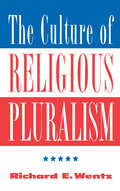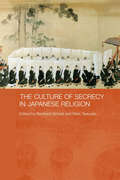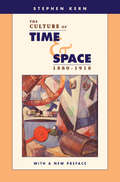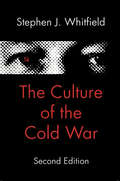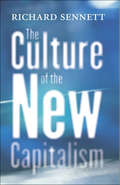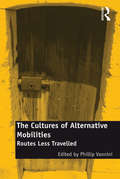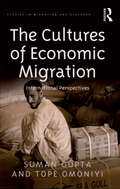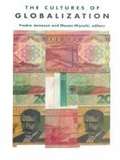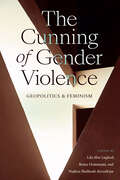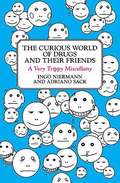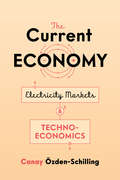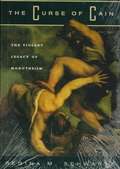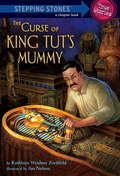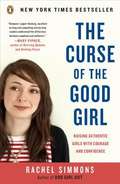- Table View
- List View
The Culture of Religious Pluralism (Explorations: Contemporary Perspectives on Religion)
by Richard WentzReligious pluralism has been a defining characteristic of the American experience since colonial times. In the twentieth century, as American society has become more radically pluralistic, the issue of religious identity is once again in flux. Providing a historical context, Richard Wentz examines the challenges that pluralism presents to denominationalism and civil religion and considers the contributions secularism and the New Age movement have made to the culture of religious pluralism. Finally, Wentz calls for a new pluralism based on civility and respect, a reimmersion into our religious traditions, and an extension of ourselves into the traditions of others.
The Culture of Secrecy in Japanese Religion
by Mark Teeuwen Bernhard ScheidThe Japanese Middle Ages were a period when forms of secrecy dominated religious practice. This fascinating collection traces out the secret characteristics and practices in Japanese religion, as well as analyzing the decline of religious esotericism in Japan. The essays in this impressive work refer to Esoteric Buddhism as the core of Japan’s "culture of secrecy". Esoteric Buddhism developed in almost all Buddhist countries of Asia, but it was of particular importance in Japan where its impact went far beyond the borders of Buddhism, also affecting Shinto as well as non-religious forms of discourse. The contributors focus on the impact of Esoteric Buddhism on Japanese culture, and also include comparative chapters on India and China. Whilst concentrating on the Japanese medieval period, this book will give readers familiar with present day Japan, many explanations for the still visible remnants of Japan’s medieval culture of secrecy.
The Culture of Time and Space, 1880-1918: With a New Preface
by Stephen KernStephen Kern writes about the sweeping changes in technology and culture between 1880 and World War I that created new modes of understanding and experiencing time and space. To mark the book’s twentieth anniversary, Kern provides an illuminating new preface about the breakthrough in interpretive approach that has made this a seminal work in interdisciplinary studies.
The Culture of Welfare Markets: The International Recasting of Pension and Care Systems (Routledge Advances in Sociology)
by Ingo BodeThis book examines the rise of welfare markets in Western societies and explores their functioning, regulation and embeddedness by addressing the particular field of old age provision, including both retirement provision and elderly care. It goes beyond a mere social policy analysis by investigating major cultural underpinnings of the new (quasi-)markets, with these underpinnings embracing collective normative representations of how societies (should) institutionally handle old age. The book looks at whether pension and care systems are converging under the influence of globalization – with marketization being a key phenomenon – and to what extent this is creating a transnational culture of welfare markets. This book, the first book to systematically describe and analyse the phenomenon of welfare markets, elucidates the complex cultural underpinnings of care and pensions systems in an era of marketization, arguing that we are facing a cultural struggle over the way late modern societies conceptualize institutional old-age provision.
The Culture of the Cold War (The American Moment)
by Stephen J. Whitfield"Without the Cold War, what's the point of being an American?" As if in answer to this poignant question from John Updike's Rabbit at Rest, Stephen Whitfield examines the impact of the Cold War—and its dramatic ending—on American culture in an updated version of his highly acclaimed study. In a new epilogue to this second edition, he extends his analysis from the McCarthyism of the 1950s, including its effects on the American and European intelligensia, to the civil rights movement of the 1960s and beyond. Whitfield treats his subject matter with the eye of a historian, reminding the reader that the Cold War is now a thing of the past. His treatment underscores the importance of the Cold War to our national identity and forces the reader to ask, Where do we go from here? The question is especially crucial for the Cold War historian, Whitfield argues. His new epilogue is partly a guide for new historians to tackle the complexities of Cold War studies.
The Culture of the New Capitalism
by Richard SennettThe distinguished sociologist Richard Sennett surveys major differences between earlier forms of industrial capitalism and the more global, more febrile, ever more mutable version of capitalism that is taking its place. He shows how these changes affect everyday life-how the work ethic is changing; how new beliefs about merit and talent displace old values of craftsmanship and achievement; how what Sennett calls "the specter of uselessness" haunts professionals as well as manual workers; how the boundary between consumption and politics is dissolving. In recent years, reformers of both private and public institutions have preached that flexible, global corporations provide a model of freedom for individuals, unlike the experience of fixed and static bureaucracies Max Weber once called an "iron cage. " Sennett argues that, in banishing old ills, the new-economy model has created new social and emotional traumas. Only a certain kind of human being can prosper in unstable, fragmentary institutions: the culture of the new capitalism demands an ideal self oriented to the short term, focused on potential ability rather than accomplishment, willing to discount or abandon past experience. In a concluding section, Sennett examines a more durable form of self hood, and what practical initiatives could counter the pernicious effects of "reform. "
The Cultures of Alternative Mobilities: Routes Less Travelled
by Phillip VanniniThe Cultures of Alternative Mobilities presents a series of ethnographic studies, focusing on the local cultures of mobilities and immobilities, emphasizing the everyday sense of contingency and heterogeneity that accompanies them. Compensating for the excess of theory and criticism based on the notion of 'hypermobilities', this book sheds light on the nuanced differences and idiosyncrasies of mobility, with a view to rediscovering meanings and lifestyles marked by movement and immobility. Original, empirical and global case studies are presented by an international team of scholars, exploring the complex, negotiated and contingent nature of the social worlds of movement. By avoiding sweeping generalizations on the deeply connected and readily mobile nature of society as a whole, this volume sheds light on the diversity of mobility modes in an accessible and interdisciplinary form that will be of key interest, to sociologists, geographers and scholars of human mobility, communication and culture.
The Cultures of Economic Migration: International Perspectives (Studies in Migration and Diaspora)
by Tope OmoniyiThis volume explores the processes of economic migration, the social conditions that follow it and the discourses that underlie research into it. Reflecting critically on economic migration and on the process of studying and creating knowledge about it, the contributors address the question of whether recent enquiries into modernity bring a newer and better comprehension of the nature of dislocation and movement, or whether these serve simply to replicate familiar modes of placing people and individuals. The book is organized into perspectives in and on specific continents - Europe, Asia and Africa - in order to explore notions regarding economic migration within and across regions as well as towards displacing the Eurocentrism of many studies of migration.
The Cultures of Globalization
by Masao Miyoshi Fredric JamesonA pervasive force that evades easy analysis, globalization has come to represent the export and import of culture, the speed and intensity of which has increased to unprecedented levels in recent years. The Cultures of Globalization presents an international panel of intellectuals who consider the process of globalization as it concerns the transformation of the economic into the cultural and vice versa; the rise of consumer culture around the world; the production and cancellation of forms of subjectivity; and the challenges it presents to national identity, local culture, and traditional forms of everyday life.Discussing overlapping themes of transnational consequence, the contributors to this volume describe how the global character of technology, communication networks, consumer culture, intellectual discourse, the arts, and mass entertainment have all been affected by recent worldwide trends. Appropriate to such diversity of material, the authors approach their topics from a variety of theoretical perspectives, including those of linguistics, sociology, economics, anthropology, and the law. Essays examine such topics as free trade, capitalism, the North and South, Eurocentrism, language migration, art and cinema, social fragmentation, sovereignty and nationhood, higher education, environmental justice, wealth and poverty, transnational corporations, and global culture. Bridging the spheres of economic, political, and cultural inquiry, The Cultures of Globalization offers crucial insights into many of the most significant changes occurring in today's world.Contributors. Noam Chomsky, Ioan Davies, Manthia Diawara, Enrique Dussel, David Harvey, Sherif Hetata, Fredric Jameson, Geeta Kapur, Liu Kang, Joan Martinez-Alier, Masao Miyoshi, Walter D. Mignolo, Alberto Moreiras, Paik Nak-chung, Leslie Sklair, Subramani, Barbara Trent
The Cunning of Gender Violence: Geopolitics and Feminism (Next Wave: New Directions in Women's Studies)
by Lila Abu-Lughod, Rema Hammami, and Nadera Shalhoub-KevorkianThe Cunning of Gender Violence focuses on how a once visionary feminist project has folded itself into contemporary world affairs. Combating violence against women and gender-based violence constitutes a highly visible and powerful agenda enshrined in international governance and law and embedded in state violence and global securitization. Case studies on Palestine, Bangladesh, Iran, India, Pakistan, Israel, and Turkey as well as on UN and US policies trace the silences and omissions, along with the experiences of those subjected to violence, to question the rhetoric that claims the agenda as a “feminist success story.” Because religion and racialized ethnicity, particularly “the Muslim question,” run so deeply through the institutional structures of the agenda, the contributions explore ways it may be affirming or enabling rationales and systems of power, including civilizational hierarchies, that harm the very people it seeks to protect.Contributors. Lila Abu-Lughod, Nina Berman, Inderpal Grewal, Rema Hammami, Janet R. Jakobsen, Shenila Khoja-Moolji, Vasuki Nesiah, Samira Shackle, Sima Shakhsari, Nadera Shalhoub-Kevorkian, Dina M Siddiqi, Shahla Talebi, Leti Volpp, Rafia Zakaria
The Cunning of Recognition: Indigenous Alterities and the Making of Australian Multiculturalism
by Elizabeth A PovinelliThe Cunning of Recognition is an exploration of liberal multiculturalism from the perspective of Australian indigenous social life. Elizabeth A. Povinelli argues that the multicultural legacy of colonialism perpetuates unequal systems of power, not by demanding that colonized subjects identify with their colonizers but by demanding that they identify with an impossible standard of authentic traditional culture. Povinelli draws on seventeen years of ethnographic research among northwest coast indigenous people and her own experience participating in land claims, as well as on public records, legal debates, and anthropological archives to examine how multicultural forms of recognition work to reinforce liberal regimes rather than to open them up to a true cultural democracy. The Cunning of Recognition argues that the inequity of liberal forms of multiculturalism arises not from its weak ethical commitment to difference but from its strongest vision of a new national cohesion. In the end, Australia is revealed as an exemplary site for studying the social effects of the liberal multicultural imaginary: much earlier than the United States and in response to very different geopolitical conditions, Australian nationalism renounced the ideal of a unitary European tradition and embraced cultural and social diversity. While addressing larger theoretical debates in critical anthropology, political theory, cultural studies, and liberal theory, The Cunning of Recognition demonstrates that the impact of the globalization of liberal forms of government can only be truly understood by examining its concrete--and not just philosophical--effects on the world.
The Curiosity of School
by Zander ShermanIt¿s one thing we all have in common. We¿ve all been to school. But as Zander Sherman shows in this fascinating, often shocking account of institutionalized education, sending your kids off to school was not always normal. In fact, school is a very recent invention. Taking the reader back to 19th-century Prussia, where generals, worried about soldiers¿ troubling individuality, sought a way to standardize every young man of military age, through to the most controversial debates about the topic of education today, Sherman tells the often astonishing stories of the men and women¿and corporations¿that have defined what we have come to think of as both the privilege and the responsibility of being educated. With clarity, detachment, and wry humour, Sherman presents the story of school through the stories of its most influential¿and peculiar¿reformers. We learn that Montessori schools were embraced by Mussolini's Italy, that the founder of Ryerson University was a champion of the Canadian residential school system (for which the government apologized a century and a half later), and that Harvard was once a byword for mediocrity. Along the way, we discover that the SAT was invented as an intelligence test designed to allow the state to sterilize ¿imbeciles¿ and in its current state is perhaps equally pernicious, that suicide in the wake of disappointing results in the state university placement exams is the fifth leading cause of death in China, and that commercialized higher education seduces students into debt as cynically as credit card companies do.
The Curiosity of School
by Zander ShermanIt's one thing we all have in common. We've all been to school. But as Zander Sherman shows in this fascinating, often shocking account of institutionalized education, sending your kids off to school was not always normal. In fact, school is a very recent invention. Taking the reader back to 19th-century Prussia, where generals, worried about soldiers' troubling individuality, sought a way to standardize every young man of military age, through to the most controversial debates that swirl around the world about the topic of education today, Sherman tells the often astonishing stories of the men and women-and corporations-that have defined what we have come to think of as both the privilege and the responsibility of being educated. Along the way, we discover that the SAT was invented as an intelligence test designed to allow the state to sterilize "imbeciles," that suicide in the wake of disappointing results in the state university placement exams is the fifth leading cause of death in China, and that commercialized higher education seduces students into debt as cynically as credit card companies do. Provocative, entertaining-and even educational-The Curiosity of School lays bare the forces that shape the institution that shapes all of us.
The Curious History of Dating: From Jane Austen to Tinder
by Nichi HodgsonAN EMPHATICALLY FEMINIST HISTORY OF DATING'A new approach to romance... The heroines of Regency novels could teach today's young women a trick or two' Sunday TimesWhat if Mr Darcy had simply been able to swipe right?'This book was a real education for me. It's like a Lonely Planet guidebook to dating.'Gilo'Lessons to learn for committed singletons and happily married alike, and everyone in between.'Anon'I loved it.'Adele Taylor'I found it hard to put down.'richie666Dating has never been easy. The road to true love has always been rutted with heartbreak, but do we have it any easier today? How did Victorians 'come out'? How did love blossom in war-torn Europe? And why did 80s video-dating never take off?Bursting with little-known facts and tantalizing tales of lovelorn men and besotted women, Nichi Hodgson's intriguing history of amorous relationships, from enamoured Georgians to frenziedly swiping millennials (and everyone in between) may leave you grateful that you live - and love - today.
The Curious History of Vegetables: The Curious History of Vegetables
by Bill Laws Henrietta GreenCouch potatoes are idlers, cabbageheads are dunces, swede-bashers are stupid and you may as well give up life if you become a vegetable.A vegetable existence may imply dull monotony, but the humble vegetable has sparked protests, threatened to topple a British government and almost triggered a revolution. From the Scottish Presbyterian campaign against the ‘sinful potato’ to the class act that turned the carrot into a propaganda tool, from garlic inscriptions on Egyptian pyramids to Neolithic broad beans and medieval cabbage, and from the Dig for Victory campaign to competitive vegetable growing, The Curious History of Vegetables highlights just how vital our produce really is.
The Curious World of Drugs and Their Friends
by Ingo Niermann Adriano SackRead Adriano Sack's posts on the Penguin Blog. "Curiouser and curiouser" --fun and fascinating facts from the world of drugs. Following in the tradition of The Ultimate Book of Useless Information, The Curious World of Drugs and Their Friends is a wry potpourri of interesting information about every conceivable kind of drug. Readers can feed their heads with anecdotes, facts, lists, statistics, and illustrations, including: * The test results of animals on LSD--cats lose their fear of dogs, and goats walk in geometric patterns * Drugs found in nature, from magic mushrooms to St. John's wort to beaver secretions * Celebrities who overdosed at age 27--Jimi Hendrix, Janis Joplin, Jim Morrison, Kurt Cobain, Brian Jones, and Jean Michel-Basquiat * Imaginary drugs in literature and film, from spice the mélange in Dune to Moloko plus in A Clockwork Orange * Nicknames for a joint--from doobie to giggly stick to Mr. Boom Bizzle * The global percentages of adults who have used cannabis--.004 percent in Singapore and 12.6 percent in the United States * The uses of opium in ancient Rome--from treatments for insomnia and epilepsy to colic and deafness * The most glamorous rehab clinics and their celebrity alumni * Mini-biographies of the biggest drug kingpins around the world Wacky but well-researched, unbiased and shameless, The Curious World of Drugs and Their Friends dares to take readers on a long, strange trivia trip.
The Current Economy: Electricity Markets and Techno-Economics
by Canay Özden-SchillingElectricity is a quirky commodity: more often than not, it cannot be stored, easily transported, or imported from overseas. Before lighting up our homes, it changes hands through specialized electricity markets that rely on engineering expertise to trade competitively while respecting the physical requirements of the electric grid. The Current Economy is an ethnography of electricity markets in the United States that shows the heterogenous and technologically inflected nature of economic expertise today. Based on ethnographic fieldwork among market data analysts, electric grid engineers, and citizen activists, this book provides a deep dive into the convoluted economy of electricity and its reverberations throughout daily life. Canay Özden-Schilling argues that many of the economic formations in everyday life come from work cultures rarely suspected of doing economic work: cultures of science, technology, and engineering that often do not have a claim to economic theory or practice, yet nonetheless dictate forms of economic activity. Contributing to economic anthropology, science and technology studies, energy studies, and the anthropology of expertise, this book is a map of the everyday infrastructures of economy and energy into which we are plugged as denizens of a technological world.
The Curse of Cain: The Violent Legacy of Monotheism
by Regina M. SchwartzThe Curse of Cain confronts the inherent ambiguities of biblical stories on many levels and, in the end, offers an alternative, inspiring reading of the Bible that is attentive to visions of plenitude rather than scarcity, and to an ethics based on generosity rather than violence.
The Curse of King Tut's Mummy
by Kathleen Weidner ZoehfeldWhen the pharoahs of Egypt died, they were mummified and buried in pyramids and tombs with all their riches. But as centuries passed, the tombs were looted and the pharoahs' gold stolen. Then Howard Carter found the greatest Egyptian treasure trove of all—the tomb of King Tut's mummy! But did the amazing treasure come with a deadly curse? From the Trade Paperback edition.
The Curse of King Tut's Mummy (Totally True Adventures)
by Kathleen Weidner Zoehfeld James NelsonWhen the pharoahs of Egypt died, they were mummified and buried in pyramids and tombs with all their riches. But as centuries passed, the tombs were looted and the pharoahs' gold stolen. Then Howard Carter found the greatest Egyptian treasure trove of all--the tomb of King Tut's mummy! But did the amazing treasure come with a deadly curse?From the Trade Paperback edition.
The Curse of Medusa: A Modern Graphic Greek Myth (Mythology Graphics)
by Jessica GundersonLife isn’t easy when you’re cursed with a headful of snakes for hair. Medusa knows that better than anyone. But she didn’t start out in such a state. What happened? Who’s to blame? And who’s the real hero? Find out in this modern, action-packed graphic retelling of a classic Greek myth.
The Curse of Oak Island: The Story of the World's Longest Treasure Hunt
by Randall SullivanAn in-depth look into the history of a Canadian island rumored to hold buried treasure and of centuries of failed attempts to claim the riches.Updated with new material from the authorIn 1795, a teenager discovered a mysterious circular depression in the ground on Oak Island, in Nova Scotia, Canada, and ignited rumors of buried treasure. Early excavators uncovered a clay-lined shaft containing layers of soil interspersed with wooden platforms, but when they reached a depth of ninety feet, water poured into the shaft and made further digging impossible.Since then, the mystery of Oak Island’s “Money Pit” has enthralled generations of treasure hunters, including a Boston insurance salesman whose obsession ruined him; a young Franklin Delano Roosevelt; and film star Errol Flynn. Perplexing discoveries have ignited explorers’ imaginations: a flat stone inscribed in code; a flood tunnel draining from a man-made beach; a torn scrap of parchment; stone markers forming a huge cross. Swaths of the island were bulldozed looking for answers; excavation attempts have claimed two lives. Theories abound as to what’s hidden on Oak Island–pirates’ treasure, Marie Antoinette’s lost jewels, the Holy Grail, proof that Sir Francis Bacon was the true author of Shakespeare’s plays–yet to this day, the Money Pit remains an enigma.The Curse of Oak Island is a fascinating account of the strange, rich history of the island and the intrepid treasure hunters who have driven themselves to financial ruin, psychotic breakdowns, and even death in pursuit of answers. And as Michigan brothers Marty and Rick Lagina become the latest to attempt to solve the mystery, as documented on the History Channel’s television show The Curse of Oak Island, Sullivan takes readers along to follow their quest firsthand.Praise for The Curse of Oak Island“Sullivan writes with open-minded balance, rendering the Oak Island story into a weirdly fascinating mystery.” —Booklist“A definitive read for fans of the History Channel television show. Sullivan delves deeper into the history, personalities, and theories presented only briefly on the show. . . . The book is incredibly well researched and the presentation . . . is very readable. If you’ve watched The Curse of Oak Island and were frustrated that snippets and possibilities were left tantalizingly unexplored, this is the book for you.” —Heather Cover, Homewood Library (Birmingham, Alabama)“Sullivan isn’t writing about Oak Island the TV show; his subject is Oak Island the place, largely as seen and imagined by the show’s viewers. So, if you’ve ever been more entranced by the show’s long trips into history and theoretical island encounters across history, Sullivan’s book probably needs to be on your Christmas list.” —Starcasm
The Curse of the Good Girl
by Rachel SimmonsBestselling author of Odd Girl Out, Rachel Simmons exposes the myth of the Good Girl, freeing girls from its impossible standards and encouraging them to embrace their real selves In The Curse of the Good Girl, bestselling author Rachel Simmons argues that in lionizing the Good Girl we are teaching girls to embrace a version of selfhood that sharply curtails their power and potential. Unerringly nice, polite, modest, and selfless, the Good Girl is a paradigm so narrowly defined that it's unachievable. When girls inevitably fail to live up- experiencing conflicts with peers, making mistakes in the classroom or on the playing field-they are paralyzed by self-criticism, stunting the growth of vital skills and habits. Simmons traces the poisonous impact of Good Girl pressure on development and provides a strategy to reverse the tide. At once expository and prescriptive, The Curse of the Good Girl is a call to arms from a new front in female empowerment. Looking to the stories shared by the women and girls who attend her workshops, Simmons shows that Good Girl pressure from parents, teachers, coaches, media, and peers erects a psychological glass ceiling that begins to enforce its confines in girlhood and extends across the female lifespan. The curse of the Good Girl erodes girls' ability to know, express, and manage a complete range of feelings. It expects girls to be selfless, limiting the expression of their needs. It requires modesty, depriving the permission to articulate their strengths and goals. It diminishes assertive body language, quieting voices and weakening handshakes. It touches all areas of girls' lives and follows many into adulthood, limiting their personal and professional potential. Since the popularization of the Ophelia phenomenon, we have lamented the loss of self-esteem in adolescent girls, recognizing that while the doors of opportunity are open to twenty-first-century American girls, many lack the confidence to walk through them. In The Curse of the Good Girl, Simmons provides a catalog of tangible lessons in bolstering the self and silencing the curse of the Good Girl. At the core of Simmons's radical argument is her belief that the most critical freedom we can win for our daughters is the liberty not only to listen to their inner voice but also to act on it. Watch a Video .
The Curse of the Mummy: Uncovering Tutankhamun's Tomb (Scholastic Focus)
by Candace FlemingAward-winning and critically acclaimed author Candace Fleming presents the edge-of-your-seat true story of the search for Tutankhamun's tomb, the Western public's belief that the dig was cursed, and the battle for ownership of the treasures within.During the reign of the New Kingdom of Egypt, the boy pharaoh Tutankhamun ruled and died tragically young. In order to send him on his way into the afterlife, his tomb was filled with every treasure he would need after death. And then, it was lost to time, buried in the sands of the Valley of the Kings.His tomb was also said to be cursed.Centuries later, as Egypt-mania gripped Europe, two Brits -- a rich earl with a habit for gambling and a disreputable, determined archeologist -- worked for years to rediscover and open Tutankhamun's tomb. But once it was uncovered, would ancient powers take their revenge for disturbing and even looting the pharaoh's resting place? What else could explain the mysterious illnesses, accidents, and deaths that began once it was found?
The Curse of the Pharaohs' Tombs: Tales of the unexpected since the days of Tutankhamun
by Paul HarrisonThe Curse of the Pharaohs Tombs is the definitive book on Ancient Egyptian tomb curses, providing new information and data never before published whilst exploring the many incidents and deaths associated with tomb curses. The book puts the record straight on matters which have been wrongly recorded by others, such as the legend of Tutankhamun, as well as presenting new data never before published associated with matters such as the torment Howard Carter suffered before his death. It also contains exclusive information and interviews with the family members and archaeologists associated with the curses, including experts at the British Museum and Cairo Museum.Paul Harrison also covers the history of Egyptian tomb curses, why they were placed at the entrance to some tombs and not others, as well as the frightening reality of mummification after death in Ancient Egypt. Closer to home, the hundreds of deaths and haunted tube station (Museum) which are associated with the curse of Amen-Ra (housed in the British Museum) is covered along with the mysterious deaths and tragedy associated with Cleopatras needle on the Embankment of the River Thames.
